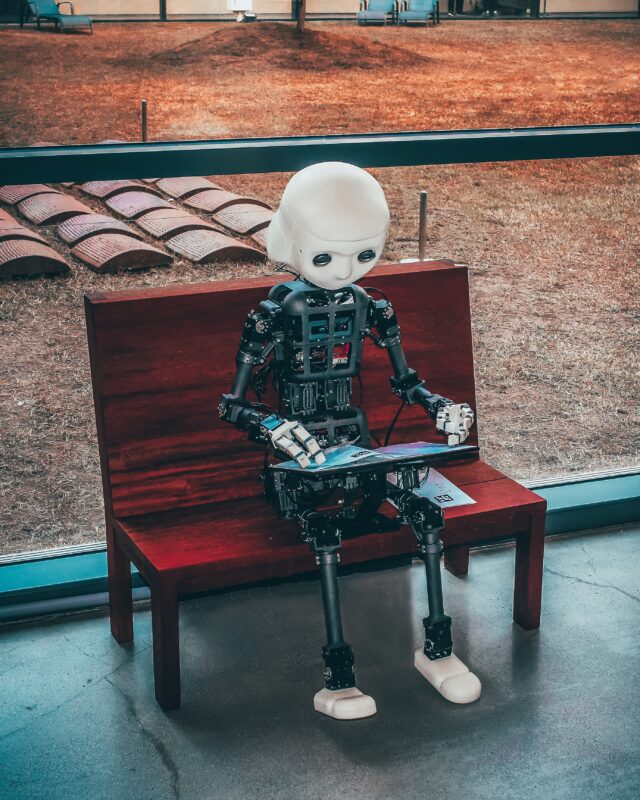Since the advent of AI based on large language models, such as ChatGPT, there’s been a lot written about the possibility of it replacing human writers. Well, now that a lot of the hype has died down, and we’ve all had a chance to test out just what AI is capable of when it comes to creating text, I thought I’d share my own thoughts on the subject.
As a writer, the possibility of being replaced by a machine is something in which I used to take a great deal of interest. Not least to gauge just how soon I would be made redundant, and could fulfil my dream of becoming a basket weaver in the Outer Hebrides.
But you’ll notice I said ‘used to’. And the reason for that is that AI-generated copy is still a bit rubbish. Yes, it’s a great tool, and has proved useful for a lot of what I do on a daily basis, but at the moment it certainly lacks the depth and nuance inherent in writing produced by any experienced copywriter.
So, while still recognising the things it can do well, let’s take a look at a few instances where AI, specifically ChatGPT, falls short as a writer. Sometimes very short indeed.
The art of overdoing it
With its seemingly endless love affair with adjectives, ChatGPT is a master at this art. Flowery doesn’t begin to describe its output. Ask it to compose even the simplest of sentences and the verbosity is on another level. It believes everything is a ‘tapestry’ which needs to be ‘navigated’. Ask it not to use the word ‘landscape’ (which it has done in every response I’ve ever had) and it comes back with the word ’realm’. And it’s yet to find a subject it doesn’t want to ‘delve into’ or ‘dive into’.
This convoluted and overly intricate language just detracts from the clarity of the message. In contrast, human writers understand the elegance of restraint. And they value the power of clear, concise and direct language, recognising that the strength of a narrative often lies in its straightforwardness.
Without finessing the prompt many times, ChatGPT has a very clear writing style. If you read it, you’ll know it was written by ChatGPT. Not least because of its excessive use of colons in the titles.
The missing spark
Okay, ChatGPT can churn out content remarkably quickly. But it lacks the intrinsic creativity and emotional depth that’s present in human writing. In its current state, it really doesn’t have the ability to forge an emotional connection and present an engaging narrative.
It’s a bit like comparing a hologram to the person it represents. The form is there, but the spirit is conspicuously absent. It doesn’t include the quirks and flaws which make human-generated copy so interesting.
It can’t take (or make) a joke
Humour in writing is something that ChatGPT struggles with. It seems the nuances of wit, irony and satire are completely lost on it. Nor does it have the understanding of human culture and the subtleties of language required to effectively employ humour in writing.
It’s like a comedian who explains their punchlines – the magic is lost in translation. Human writers, however, understand the cultural contexts and unspoken rules that make a joke land, and most can create humour that’s contextually relevant, culturally aware and tailored to their audience.
Don’t get me wrong, there are very many unfunny carbon-based writers too.
More than just words
Language is dynamic and continually evolving, shaped by cultural shifts, societal trends, historical contexts and even internet memes.
Human writers have the ability to adapt their language and style to these changes; although programmable, ChatGPT can’t innately sense these subtle shifts in language and culture. It’s quite possible to teach a parrot to speak, but it’s only ever going to mimic words, without understanding their evolving meanings. It operates on algorithms and data, not empathy and intuition.
And finally . . .
Decent human writers are able to address sensitive topics with care and respect cultural nuances, requiring a level of judgement and understanding that is inherently, well, human. ChatGPT, operating on pre-programmed algorithms, is devoid of the ethical reasoning and empathetic understanding that are essential for impactful and responsible writing.
So, while ChatGPT can be useful at various stages of the writing process (helping to generate ideas, overcoming writer’s block or drafting preliminary content) the emotional depth, creative insight and personal touch that humans bring to their work and to a brand’s voice remain irreplaceable. For the time being.
*Yes, of course this blog title was written by ChatGPT








